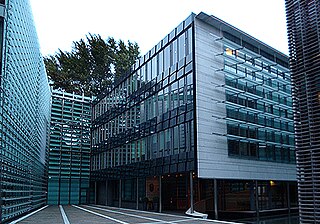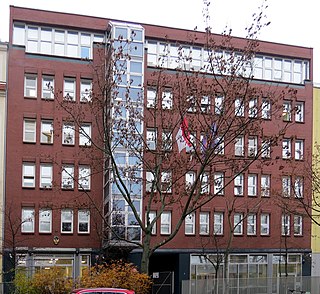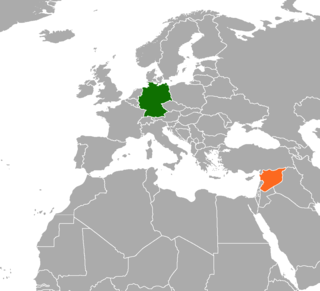
Bonn is a federal city in the German state of North Rhine-Westphalia, located on the banks of the Rhine. It has a population of over 300,000. About 24 km (15 mi) south-southeast of Cologne, Bonn is in the southernmost part of the Rhine-Ruhr region, Germany's largest metropolitan area and the second biggest metropolitan region by GDP in the European Union, with over 11 million inhabitants. It is a university city, was the birthplace of Ludwig van Beethoven and was the capital of West Germany from 1949 to 1990. Bonn was the seat of government of reunited Germany from 1990 to 1999.

The Embassy of the United States of America in Berlin is the diplomatic mission of the United States of America in the Federal Republic of Germany. It started in 1797, with the appointment of John Quincy Adams to Berlin, the capital of Prussia. There was no permanent building for the embassy until 1930, with the purchase of the Blücher Palace. During the United States involvement in World War II, the embassy ceased operations.

The United Arab Emirates and Germany established relations in May 1972. The U.A.E. has an embassy in Berlin and consulate-general in Munich while Germany maintains an embassy in Abu Dhabi and a consulate-general in Dubai. German exports amount to 5.84 billion Euros. German companies significantly contribute to the UAE's ongoing infrastructure projects and play a leading role in the country's alternative energy developments. Consequently, German Business Park, an area designed to house several of the already seven hundred present companies and their logistical needs, is in the midst of construction. There are thousands of expatriate Germans in the United Arab Emirates who have helped maintain connections between the two countries.
The following is a timeline of the history of the city of Bonn, North Rhine-Westphalia, Germany.

The Chinese Embassy in Berlin, officially the Embassy of the People's Republic of China in the Federal Republic of Germany is the head of the diplomatic mission of the People's Republic of China in Germany. There has been diplomatic mission of China in Berlin since 1877. The current embassy is located at Märkisches Ufer 54 near the Jannowitz Bridge in Luisenstadt in Berlin-Mitte. The seven-storey building, built in 1988 as the FDGB headquarter, was rebuilt from 1999 to 2001 to the present-day embassy.

King Fahd Academy was a school in Lannesdorf, Bad Godesberg district, Bonn, Germany. The school, with an attached mosque, housing elementary school through high school, opened in 1995. Financed by the King of Saudi Arabia and sponsored by Saudi Arabia, it was named after King Fahd. The school was closed at the end of the 2016/2017 school year, after long-running criticism that it was attracting Islamists to Germany. The school's last director was Ibrahim Al-Megren.

The Russian Embassy in Germany is the headquarters of the diplomatic mission of the Russian Federation in Germany. It is located in the Mitte district of the capital Berlin and occupies a building complex consisting of the main building at 63-65 Unter den Linden and several administrative and residential buildings on the Behrenstraße and Glinkastraße.

The Embassy of Sweden in Berlin is Sweden's diplomatic mission in Germany. Ambassador since 2017 is Per Thöresson. Sweden established a legation in Berlin in 1912. During World War II, it was destroyed in aerial bombings and the legation was moved to other addresses in Berlin. After the war, the Swedish legation moved to Cologne in West Germany, and in the mid-1950s to Bonn, where it remained until 1999. During the Cold War, Sweden also had an embassy in East Berlin from the 1970s onwards. In 1999, the new Swedish embassy in Berlin was inaugurated and the one in Bonn was closed. The building complex in which the Swedish embassy is located since 1999 is called Nordic Embassies.

The Russian Consulate School in Bonn is one of two Russian state-owned international schools in Germany along with the Russian Embassy School in Berlin.

The Embassy of Ireland in Berlin is the diplomatic mission of Ireland to Germany. It is located at 51 Jägerstraße since 2009.

The Israeli Embassy in Berlin is the headquarters of the diplomatic mission of Israel in Germany. It is located in the Berlin district of Schmargendorf at Auguste-Viktoria-Straße 74. Since August 22, 2022, the Israeli ambassador to Germany is Ron Prosor.

The Embassy of Peru in Berlin is the foremost diplomatic mission of the Republic of Peru in Germany. The embassy is based in Taubenstraße, Berlin-Mitte; the ambassador is Augusto Arzubiaga.

The Embassy of the Republic of Indonesia in Berlin is the diplomatic mission of the Republic of Indonesia to the Federal Republic of Germany. In addition to the embassy, Indonesia has two consulate generals in Frankfurt and Hamburg.

The Embassy of the Philippines in Berlin is the diplomatic mission of the Republic of the Philippines to the Federal Republic of Germany. First opened in 1955 as the mission to West Germany, it is currently located in the Mitte locality of central Berlin, just beyond the periphery of the Reichstag complex and near the Charité.
Relations between East Germany and the United States formally began in 1974 until the former's collapse in 1990. The relationship between the two nations was among the most hostile during the Cold War as both sides were mutually suspicious of each other. Both sides conducted routine espionage against each other and conducted prisoner exchanges for their respective citizens which included spies for both the Americans and Soviets.

Germany–Syria relations are the bilateral relations between Germany and Syria. Germany closed its Damascus embassy and stopped its recognition of Bashar Al-Assad in 2012 because of the Syrian civil war, but has never completely cut relations with the Syrian government.

Germany–Jordan relations are described by the Federal Foreign Office as having been "close and friendly for a long time". Germany is one of Jordan's most important partner countries, with intensive political and economic relations.















